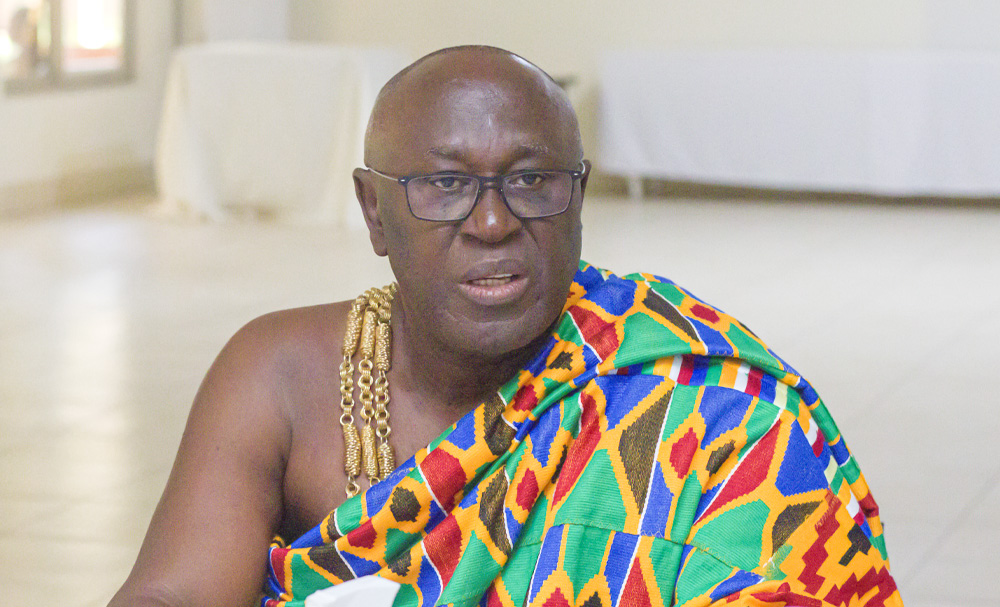KNUST new council chair charts bold path to global eminence – Nsemkeka
Akyamfoɔ Asafo Boakye Agyemang-Bonsu, the newly appointed Chairman of the Governing Council, has laid out an ambitious strategy to elevate the university to global prominence.
Speaking at 286th Regular Meeting of the Governing Council at Elmina in the Central Region, Akyamfoɔ Asafo Boakye Agyemang-Bonsu articulated a clear roadmap for transformation, rooted in five major imperatives designed to reposition KNUST as a world-class institution of science, innovation, and inclusive leadership.
Central to this vision is the creation of multidisciplinary Grand Challenge Institutes that will break down traditional academic silos.
These research hubs will bring together experts from diverse fields to collaboratively address complex societal challenges such as food security, renewable energy, and digital health.
Complementing this, the Chairman proposed the development of an Innovation Bridge, a structured ecosystem that supports the journey of research from discovery to real-world application.
This would include incubation, acceleration, and venture funding components to ensure that innovations emerging from KNUST’s laboratories translate into viable products and services that benefit society and contribute to economic growth.
Akyamfoɔ Agyemang-Bonsu also emphasized the importance of forging strategic alliances with globally renowned universities and industries.
These partnerships, he stressed, must go beyond ceremonial relationships to include joint research centers, dual degree programmes, and shared intellectual property, ensuring mutual benefit and academic depth.
To maintain accountability and ensure progress, the Chairman announced plans for a Governance Excellence Framework that will measure the university’s performance against global standards.
This framework will promote transparency, track key institutional metrics, and publish outcomes annually, fostering a culture of evidence-based decision-making.
He again proposed the establishment of an Innovation Moonshot Fund, a dedicated financial mechanism to support high-risk, high-reward research initiatives.
This fund would back bold scientific ventures that conventional funding streams often overlook, such as developing drought-resistant crops using gene editing, creating AI-powered diagnostic tools for rural healthcare, and pioneering next-generation battery technologies using local materials.
“With these initiatives,” he said, “KNUST will not only produce graduates but create solutions, industries, and prosperity for Ghana and beyond.”
Akyamfoɔ Asafo Boakye Agyemang-Bonsu concluded with a call for unity and purpose among the university’s leadership, pledging to work in close partnership with the Vice-Chancellor, Registrar, and Council members to achieve these transformative goals.
“We have been entrusted with Ghana’s technological future,” he affirmed. “Now is the time to rise to that responsibility.”
He emphasized the urgency of strategic clarity, revealing that the current Corporate Strategic Plan expires in December 2025.
While a committee has been set up to begin reviewing the framework for the next phase, the Chairman urged that the effort must go beyond administrative formalities. “This is our opportunity to redefine what a 21st-century African university of science and technology can achieve,” he said.
He challenged the committee and the wider university leadership to develop a forward-looking 2026–2030 blueprint with urgency, boldness, and visionary depth, ensuring continuity while embracing future imperatives.
AI, Green Hydrogen, and Gender Equity With a Human-Centered Approach
Akyamfoɔ Asafo Boakye Agyemang-Bonsu, also urged the university to claim continental leadership in artificial intelligence, green hydrogen innovation, and gender equity in science, while remaining firmly grounded in human values and ethical responsibility.
He envisioned the university using AI to solve real-world problems in healthcare, agriculture, and education, particularly within the Ashanti Region.
But he was quick to emphasize that science and technology cannot stand alone.
“True innovation emerges at the intersection of technical brilliance and human wisdom,” he said. “Science without ethics, and technology without cultural relevance, are incomplete paradigms.”
To that end, he called for a deeply integrated academic approach, fusing science and engineering with the arts, humanities, and ethics. “Our graduates must be more than technically proficient, they must be intellectually complete,” he stressed.
Akyamfoɔ Asafo Boakye Agyemang-Bonsu also urged KNUST to establish West Africa’s first green hydrogen research and production hub and to lead a transformation in gender participation in STEM.
“We must dismantle every barrier that prevents women from fully participating in scientific research and technological innovation,” he declared.

